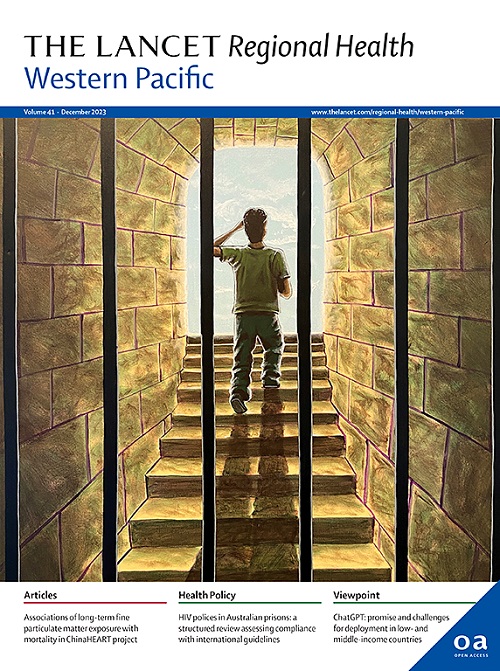The role of family caregiving in the management of individuals with mental illnesses and the outcome of family-based interventions for mental illnesses in China: a scoping review
IF 7.6
1区 医学
Q1 HEALTH CARE SCIENCES & SERVICES
引用次数: 0
Abstract
The effects of China's rapid economic development and urbanisation on family caregivers' responsibilities for providing essential practical, social, and psychological support to family members with mental illnesses are unclear. This scoping review identified 176 relevant studies published from 1 January 2000 to 31 December 2023 in six English-language and three Chinese-language databases. Most studies focus on family caregiving for individuals with schizophrenia (63 studies), autism (40 studies), or dementia (39 studies). Family caregiving—subclassified as informational, concrete, or psychological—was beneficial both for patients and their family members, but providing support often necessitated substantial sacrifices by family caregivers, many of whom experience psychological distress and financial difficulties. The type and intensity of the support provided are influenced by the severity of the patient's symptoms, financial and other resources of the patient's family, community members' beliefs about mental illnesses, and the local availability of mental health and social welfare services. Results from intervention studies indicate that different methods of enhancing family caregiving improved outcomes for individuals with mental illnesses. However, the methodological quality of the intervention studies was poor, and most of the studies were conducted in inpatient settings, so the benefits of these family-based strategies remain uncertain. Rapid economic development and urbanisation in China are resulting in fundamental changes in the relative responsibilities of different stakeholders for providing social welfare services—individuals, families, communities, and governmental agencies. Understanding and enhancing the role that families play in the support of community members with mental illnesses will require improving the quality of research about this issue, expanding the range of mental health conditions considered, and, most importantly, developing a dynamic overarching theoretical framework that integrates the many factors influencing ongoing changes in the structure and functioning of Chinese families.
中国家庭照护在精神疾病患者管理中的作用及以家庭为基础的精神疾病干预的结果:范围综述
中国快速的经济发展和城市化对家庭照顾者为患有精神疾病的家庭成员提供必要的实际、社会和心理支持的责任的影响尚不清楚。这项范围审查确定了从2000年1月1日至2023年12月31日在6个英文和3个中文数据库中发表的176项相关研究。大多数研究关注的是精神分裂症(63项研究)、自闭症(40项研究)或痴呆症(39项研究)患者的家庭护理。家庭照护分为信息照护、具体照护和心理照护三种,对患者及其家庭成员都是有益的,但提供支持往往需要家庭照护者做出重大牺牲,其中许多人经历了心理困扰和经济困难。所提供支持的类型和强度受到以下因素的影响:患者症状的严重程度、患者家庭的经济和其他资源、社区成员对精神疾病的看法,以及当地是否有精神卫生和社会福利服务。干预研究的结果表明,加强家庭照顾的不同方法改善了精神疾病患者的结果。然而,干预研究的方法学质量较差,而且大多数研究是在住院环境中进行的,因此这些以家庭为基础的策略的益处仍然不确定。中国经济的快速发展和城市化导致不同利益相关者(个人、家庭、社区和政府机构)在提供社会福利服务方面的相对责任发生了根本性的变化。理解和加强家庭在支持社区精神疾病成员方面发挥的作用,需要提高这一问题的研究质量,扩大所考虑的精神健康状况的范围,最重要的是,建立一个动态的总体理论框架,整合影响中国家庭结构和功能持续变化的许多因素。
本文章由计算机程序翻译,如有差异,请以英文原文为准。
求助全文
约1分钟内获得全文
求助全文
来源期刊

The Lancet Regional Health: Western Pacific
Medicine-Pediatrics, Perinatology and Child Health
CiteScore
8.80
自引率
2.80%
发文量
305
审稿时长
11 weeks
期刊介绍:
The Lancet Regional Health – Western Pacific, a gold open access journal, is an integral part of The Lancet's global initiative advocating for healthcare quality and access worldwide. It aims to advance clinical practice and health policy in the Western Pacific region, contributing to enhanced health outcomes. The journal publishes high-quality original research shedding light on clinical practice and health policy in the region. It also includes reviews, commentaries, and opinion pieces covering diverse regional health topics, such as infectious diseases, non-communicable diseases, child and adolescent health, maternal and reproductive health, aging health, mental health, the health workforce and systems, and health policy.
 求助内容:
求助内容: 应助结果提醒方式:
应助结果提醒方式:


